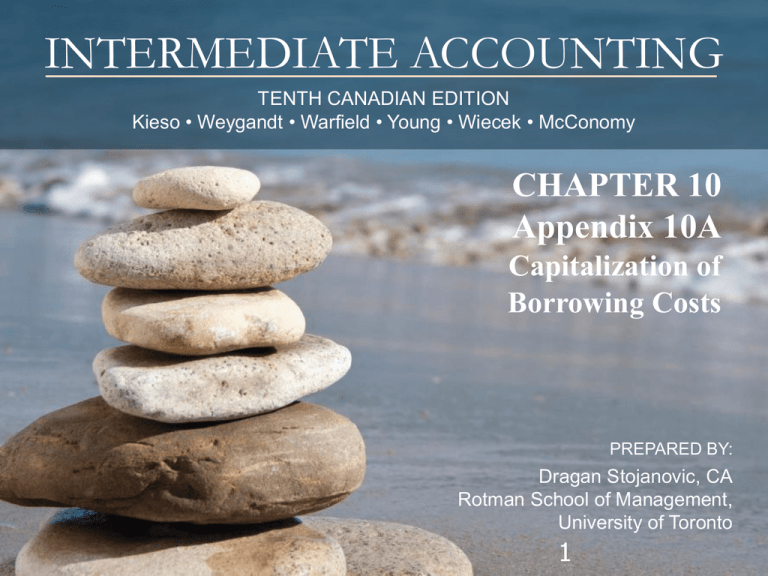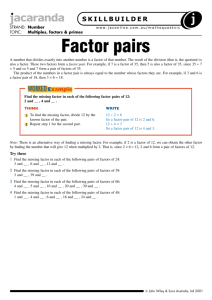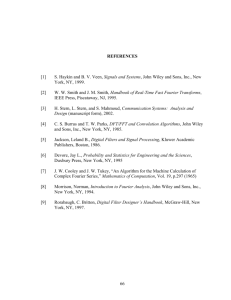
INTERMEDIATE ACCOUNTING
TENTH CANADIAN EDITION
Kieso • Weygandt • Warfield • Young • Wiecek • McConomy
CHAPTER 10
Appendix 10A
Capitalization of
Borrowing Costs
PREPARED BY:
Dragan Stojanovic, CA
Rotman School of Management,
University of Toronto
1
Borrowing Costs
• Under IFRS, borrowing costs that can be directly
attributed to acquisition, construction, or
development of “qualifying assets” should be
capitalized.
• Under ASPE, management has a choice of
capitalizing or expensing such costs.
Copyright © John Wiley & Sons Canada, Ltd.
2
Capitalization of Borrowing Costs
•Four questions must be answered:
•What are the qualifying assets?
•What is the capitalization period?
•What is the amount of interest to be
capitalized?
•What disclosures are needed?
Copyright © John Wiley & Sons Canada, Ltd.
3
Qualifying Assets
• Assets that take a substantial period of time to get ready
for intended use or sale
• Examples of assets that do not qualify:
– Assets ready for use or sale when acquired
– Assets produced over a short period of time
– Assets not undergoing development to get them ready for
use
Copyright © John Wiley & Sons Canada, Ltd.
4
Capitalization Period
•
•
•
Capitalization period begins when all three
conditions are present:
1. Expenditures for the asset have been
made
2. Activities for readying the asset are in
progress
3. Borrowing costs are being incurred
Capitalization continues for as long as these
three conditions exist
Capitalization ends when asset is substantially
complete and ready for use
Copyright © John Wiley & Sons Canada, Ltd.
5
Amount to Capitalize
• Borrowing costs must be directly related to
asset
• Lower of actual borrowing costs or
avoidable borrowing costs
– cost of capital for shareholders’ equity is not
included in borrowing costs
• Weighted-average accumulated
expenditures (WAAE) method is used to
find borrowing costs to be capitalized
Copyright © John Wiley & Sons Canada, Ltd.
6
Borrowing Costs Capitalization –
Issues
Amount of capitalized interest is based on the intended
use of the land purchased
Intended Use:
Capitalized Interest Cost Attached to:
Specific Purpose
Land
Structure Site
Structure
Lot Sales
Developed land
Investment
Interest costs should not be capitalized
Copyright © John Wiley & Sons Canada, Ltd.
7
Calculating Avoidable Borrowing
Costs
• To calculate avoidable borrowing costs,
follow four steps:
1. Determine qualifying asset expenditures
2. Determine avoidable borrowing costs
relating to asset-specific debt
3. Determine avoidable borrowing costs
relating to non-asset-specific debt
4. Determine final avoidable borrowing costs
Copyright © John Wiley & Sons Canada, Ltd.
8
Shalla Corporation – Example
Given:
• November 1, 2013 contracts with Pfeifer Construction
Co. Ltd. to construct a $1.4 million building (on land
costing $100,000)
• First payment made by Shalla to Pfeifer includes the payment for
•
the land
Payments made in 2014:
– January 1
$ 210,000
– March 1
$ 300,000
– May 1
$ 540,000
– December 31 $ 450,000
– Total
$1,500,000
• Building completed December 31, 2014
Copyright © John Wiley & Sons Canada, Ltd.
9
Shalla Corporation – Example
• Debt outstanding at December 31, 2014
– Specific Construction Debt:
15%, three year note
dated December 31, 2013 $750,000
– Other Debt:
10%, five year note
dated December 31, 2010 $550,000
12%, ten year bonds
dated December 31, 2007 $600,000
• Interest on debt is payable each December 31
Copyright © John Wiley & Sons Canada, Ltd.
10
Shalla Corporation – Example
STEP 1: Determine qualifying asset expenditures
Weighted-Average Accumulated Expenditures:
Jan. 1
Mar. 1
May. 1
Dec. 31
WAAE
$ 210,000
300,000
540,000
450,000
x
x
x
x
12/12
10/12
8/12
0/12
=
=
=
=
$210,000
250,000
360,000
0
$820,000
Note: Land payment is included in WAAE
Next step: Avoidable interest and appropriate
interest rate calculation
Copyright © John Wiley & Sons Canada, Ltd.
11
Shalla Corporation – Example
• STEP 2: Determine avoidable borrowing costs
relating to asset-specific debt
• $750,000 x 15% = $112,500
Copyright © John Wiley & Sons Canada, Ltd.
12
Shalla Corporation – Example
STEP 3: Determine avoidable borrowing costs relating
to non-asset-specific debt
Principal
5-year note
$550,000
10-year note $600,000
Total
Borrowing cost
$ 55,000
72,000
$127,000
Weighted-Average Interest Rate =
Total Interest Total Principal
(Do not include Construction Specific Debt)
$127,000 (550,000 + 600,000) = 11.04%
Copyright © John Wiley & Sons Canada, Ltd.
13
Shalla Corporation – Example
Total WAAE
Less: financed by specific loan
WAAE financed by general borrowings
X avoidable borrowing cost on general
Avoidable costs on general debt
Copyright © John Wiley & Sons Canada, Ltd.
$820,000
$750,000
$70,000
11.04%
$7,728
14
Shalla Corporation – Example
• STEP 4: Determine total borrowing costs
to capitalize
Avoidable borrowing costs
On asset-specific debt
On general debt
TOTAL
Actual Interest:
$750,000
x
15%
550,000
x
10%
600,000
x
12%
Total actual interest paid
$112,500
$7,728
=
=
=
$112,500
55,000
72,000
$239,500
Copyright © John Wiley & Sons Canada, Ltd.
15
Shalla Corporation – Example
Avoidable interest = $120,228
Actual interest
= $239,500
The lesser of these two amounts is capitalized
Journal Entry:
Dr. Building
120,228
Cr. Interest Expense
120,228
Copyright © John Wiley & Sons Canada, Ltd.
16
Interest Capitalization – Significance
•
•
Capitalized interest increases net income for
the period
Impact on EPS can be significant
Copyright © John Wiley & Sons Canada, Ltd.
17
Disclosures
• Two disclosures required:
– Amount capitalized
– Capitalization rate
Copyright © John Wiley & Sons Canada, Ltd.
18
COPYRIGHT
Copyright © 2013 John Wiley & Sons Canada, Ltd.
All rights reserved. Reproduction or translation of
this work beyond that permitted by Access Copyright
(The Canadian Copyright Licensing Agency) is
unlawful. Requests for further information should be
addressed to the Permissions Department, John
Wiley & Sons Canada, Ltd. The purchaser may make
back-up copies for his or her own use only and not
for distribution or resale. The author and the
publisher assume no responsibility for errors,
omissions, or damages caused by the use of these
programs or from the use of the information
contained herein.
19



